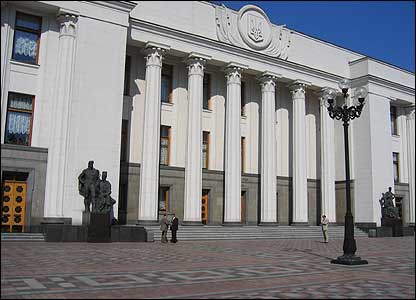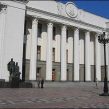
New Election Law to Prompt Consolidation of Ukrainian Opposition
Publication: Eurasia Daily Monitor Volume: 8 Issue: 227
By:

On December 8, Ukrainian President Viktor Yanukovych signed the law on parliamentary elections, which parliament passed on November 17. The new law should allow the ruling Party of Regions to win the election scheduled for October 2012, despite its declining popularity. The elections law raises the threshold parties must cross to win seats, thereby eliminating many rivals, and re-introduces a mixed system under which it should be easier for government-backed candidates to win. The new rules should prompt the consolidation of the fragmented opposition. The two largest opposition parties, Fatherland and the Front of Change (FZ), have started talks to agree on joint candidates for single-mandate districts.
Under the new rules, the 100 percent proportional system, where parliament was elected from party lists is replaced with a mixed system, where 50 percent of people’s deputies will be elected from party lists according to the same proportional system, and the other 50 percent from first-past-the-post constituencies. This is a boon for the ruling party. In the late 1990s and early 2000s, when a similar system existed in Ukraine, pro-government candidates usually defeated their rivals in the first-past-the-post constituencies, because they were supported by local mayors, council members and rich businessmen, who were, as a rule, linked to the ruling elite.
The threshold for parties is raised from three percent to five percent and blocs of parties are not allowed to participate in elections. This complicates the task for small parties, both opposition and pro-government. Several of them are likely to disappear. One example is the relatively new liberal party, Strong Ukraine, whose leader, Deputy Prime Minister Serhy Tyhypko, decided to merge the party with the Regions (see EDM, September 20). Parliamentary Speaker Volodymyr Lytvyn has also indicated on several occasions that his Popular Party could merge with the Regions. Lytvyn’s party has been a junior partner in the pro-government coalition with the Regions and the communists.
The new law was supported by the absolute majority of 366 people’s deputies in the 450-seat legislature, including many oppositionists who participated in drafting the bill. These included members of Fatherland and FZ, who explained their cooperation with the authorities by contributing provisions aimed to prevent vote rigging. They said that had they not backed the bill, the Regions using their numerical strength would have pushed through parliament an even worse bill. Apart from introducing the same mixed system and raising the election barrier, a bill written solely by the Party of the Regions would have also provided the government with incentives to falsify election results by making it possible to vote at home without medical certificates and eliminating opposition candidates on formal grounds such as typos in income declarations (Segodnya, November 18; UNIAN, November 17).
The pro-opposition website Ukrainska Pravda said the consensus in parliament on the new election law was “a coup of big parties against small parties.” The new rules may lead to a three-party system consisting of the Regions, Fatherland and FZ, the website predicted (Ukrainska Pravda, November 18). Unsurprisingly, UDAR (Punch), a new party headed by the boxing champion Vitaly Klichko, which opinion polls show is the third most popular opposition party but may not clear the 5 percent barrier, called the new law “a conspiracy,” and said that a party whose leader was imprisoned by the authorities should not have sided with the government on election rules (www.klichko.org, November 17). This was aimed at Fatherland, whose leader Yulia Tymoshenko, was sentenced to seven years in jail in October for exceeding her authority in preparing a gas deal with Russia in 2009. It is widely believed that she was punished for her opposition to Yanukovych.
FZ leader, Arseny Yatsenyuk, has claimed that the new law was “a victory for the opposition,” since it “will eliminate election fraud.” He announced that his party would start talks to form a joint list for single-mandate districts with Fatherland, adding that a higher election barrier gave the opposition a chance to unite (Ukrainska Pravda, November 18). He urged other opposition parties to join, saying that those not siding with the Fatherland-FZ alliance would support the government (Channel 5, November 28). This was a change of stance as last summer Yatsenyuk insisted said it was unnecessary for opposition parties to unite ahead of the election. Fatherland and FZ expect several smaller opposition parties to join, including the far-right Freedom, according to Fatherland deputy chairman Oleksandr Turchynov. He said in an interview with LIGABiznesInform that it was a realistic goal to put forward joint candidates from the opposition in every single-mandate district (www.liga.net, December 6).
Meanwhile, a fresh opinion poll by the Kyiv-based pollster KMIIS, has shown that trust in the mainstream parties is falling, so the well-established parties changed the rules just in time to discourage possible new challengers. The Regions is still in the lead, but support for it fell from 13.5 percent in June to 12.5 percent in November, according to the poll. The rating of Fatherland fell from 10.9 percent in June to 10.2 percent, and FZ’s rating fell from 7.7 to 7.0 percent. Yet, support for the communists rose from 4.0 to 5.1 percent, and for UDAR from 3.1 to 4.4 percent. The share of those who would vote against all, were undecided or would abstain, totaled 50 percent, rising marginally compared to June (www.zn.ua, November 29).




